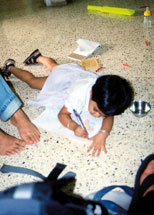Family keeps strong bonds

Sara Aparajita is the granddaughter of Javeed Alam and Jayanth Guha, a couple that was married inter-religiously. Alam and Guha´s son, Aniket, is the girl´s father. His wife is also of another religion.
The Alams have kept it all in the family. Inter-religious harmony, that is.
Years before their son, Aniket, married a woman of a different faith, Javeed Alam and Jayanti Guha joined across cultural and religious lines. And when they married, times were much tougher for them.
“In spite of all the problems, there is a secular aspect to our country,” Guha said. “Otherwise, we wouldn’t have been married.”
Alam, from Hyderabad, and Guha, from Calcutta, met while studying for their doctorates in Delhi. He is Muslim; she is Hindu.
They married in 1970. In order to have a legal marriage, the parents from both sides had to approve. Both of their fathers attended the court wedding as witnesses.
“My mother was not at all communal-minded,” Guha said. “But she would have rather I married a Hindu.”
Alam’s family had no problems at all.
At the time of the couple’s marriage, Alam worked as a lecturer at the Gyan Devi Salwan College in Delhi.
A chairman at the college, a Hindu who had been a victim of communal riots, opposed their marriage and refused to recognize it. He said he needed proof and should have been told of Alam and Guha’s engagement prior to their marriage.
“The decision to marry is ours,” Alam said. “I do not have to show proof to everyone in the world.”
The chairman lost his temper and terminated Alam.
The University of Delhi, which governed all colleges within the city, however, eventually ruled that Gyan Devi Salwan College had to reinstate Alam. But he said he did not want to go back to work for the college because it had treated him so badly.
Alam and Guha experienced not only religious but also political difficulties.
At the time of their marriage, the Jansung party, now known as the BJP, put up posters throughout Delhi accusing Alam of abducting Guha in order to marry her. The posters were written in both Hindi and Urdu (the Muslim language) to reach the faiths of Hinduism and Islam.
“They (members of the Jansung party) caused us a lot of problems,” Guha said. “Some of the political parties supported us; some kept quiet. Most of the newspapers supported us.”
Other than the propaganda posters, Guha said she faced other written problems.
“I used to get threatening letters that said, ‘You divorce him or your parents will be done to death,'” she said.
Alam believes his difficulties had political, not necessarily all religious, roots.
He said he faced prejudice because he is a Marxist and an atheist.
“I don’t feel I have experienced discrimination because I am a Muslim, never,” he said.
In spite of all their dilemmas, Alam and Guha’s marriage has persevered.
“Those who want to create gaps obviously don’t want anything that will bridge the gap,” Guha said. “I think the problems of the communalism arise because we (the Hindu and Muslim religions) are ignorant of each other. Marriage creates an understanding.”
Your donation will support the student journalists of Missouri Southern State University. Your contribution will allow us to purchase equipment and cover our annual website hosting costs.



























